Wednesday, April 12, 2006
Jayyous: A people rich in resources made poor through land confiscation
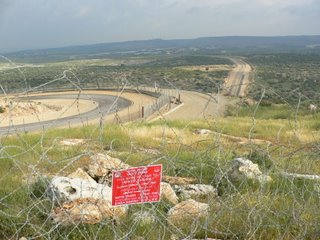
I spent two days in a village called Jayyous that's had its land confiscated by the wall. The village owns 13,000 dunum's of land (aprox 3,212 acres), but only 2,000 dunum's (aprox 494, acres) of land lies on the Eastern side of the wall. This leaves the Palestinians with barely any land for the expansion of their 3,000 strong village let alone farming land.
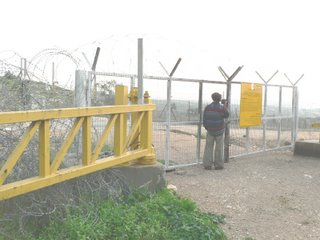 The people of Jayyous are very dependent on farming for their survival. Even the school principle subsidies his wages with money he earns from his green houses of tomatoes. The land confiscations along with the refusal to allow the majority of Palestinian's work permits inside Israel since 2002 has crippled Jayyous' economy. Jayyous is close to the green line and used to have a large number of people work in Israel.
The people of Jayyous are very dependent on farming for their survival. Even the school principle subsidies his wages with money he earns from his green houses of tomatoes. The land confiscations along with the refusal to allow the majority of Palestinian's work permits inside Israel since 2002 has crippled Jayyous' economy. Jayyous is close to the green line and used to have a large number of people work in Israel. Now the Palestinians are facing further economic hardships as the Palestinian Authority (the provider of income to 1/4 of Palestinians according to the UN) has stopped paying its workers in the wake of Europe, Israel etc cutting aid because of the Hamas victory.
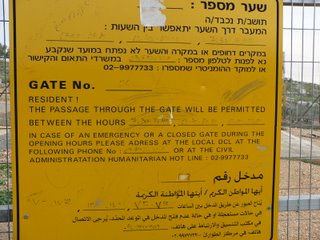
Jayyous residents can only access their land through 2 gates. These gates are open "in theory" 3 times a day and only for 15 minutes making working hours incredibly inflexible for Palestinian farmers. The gates are only open at 7.30-7.45am, 1.45pm-2pm and 5pm-5:15.
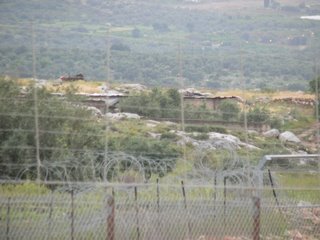 There is a family who lives on the other side of the wall cut off from the rest of the village. Originally the army would harass this family to leave their home, however the family of 7 has refused to leave, instead cut off from the village the kids are often late to school or have to wait for long periods of time to get home.
There is a family who lives on the other side of the wall cut off from the rest of the village. Originally the army would harass this family to leave their home, however the family of 7 has refused to leave, instead cut off from the village the kids are often late to school or have to wait for long periods of time to get home.During our time in Jayyous we met a farmers who had his lands cut off by the wall. His family had lost the bulk of their lands. About 75 mature olive trees were cut down just on the path of the wall itself. A friend in ISM who is a tree surgeon told me that 75 trees would be about $700 US profit for the farmer if sold for olive production.
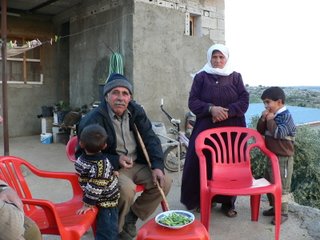
There were many more trees on the other side of the wall but they were difficult to access. Even though the trees were only 30 meter's in front of us the family would have to walk several kilometers around to the gate and then back to his land in order to access it. Many of the other villagers are in a similar situation. He pointed to a shack across the wall that his father used to camp in so he could stay over night rather then have to travel each day. The army came in and threatened to shoot him if he stayed over night.
The 11 members of his family stay in a tiny house near the wall. He once lived in a reasonably sized house in the middle of the village but doesn't want to move back there for fear of having more land taken.
The permits to cross the wall aren't a guaranteed thing though. If a Palestinian is arrested or seen to be 'causing trouble' he could be denied a permit to cross the wall. I met a man who was jailed for 5 years and exiled to Jordan for 10 for his work in Fateh. I asked if he meant Al-Aqusa and he said no Fateh and that his work was political not military in nature. The man was elderly and was no longer involved in political activity either. He was denied access to his land so only his family can cross but not him. He has been unable to visit his land for years.
The villages utilities have also been affected by the occupation. The village has 7 wells, all on the other side of the wall. Unable to gain access to their water Jayyous has had to pay to have water pumped in from another village. In terms of electricity the village has been relying on two generators to provide their power. for several hours in the afternoon there was no electricity. The village is currently in the process of hooking themselves up to the Israeli power grid. However the village isn't holding their breath as another nearby village waited 2 years after the wiring had been done for Israel to switch them into the system.
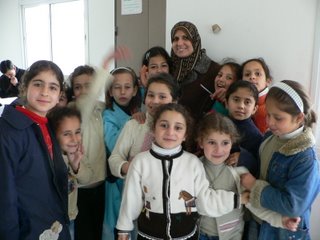
Everyone is desperate for money. Up until now there has been a Charity school running English programs in the afternoon for the kids. At the time I was there it looked like the school was going to close down in less then a month because they could not raise the $250 US dollars a month required to sustain the program's 2 teachers (who are only paid US $100 each) and rent etc. A US based charity now might be taking over where the previous donors left off but it is impossible to say how long that funding may last.
Comments:
<< Home
Sir, while I do find your blog immensely most captivating, there is a bottom line to all this that you are not addressing:
No one told the Palestinians to start an intifada.
No one told the Palestinians to start an intifada.
Intifada is just another word for struggle and if you don't support the right of an oppressed people to struggle for their freedom then maybe you would prefer it if India was still occupied by the British, East Timor never gained independence and the people of South Africa were still living under apartheid.
Maybe the Plebians should have never risen up from their masters in ancient rome and we would still be in a slave society, doesn't that sound like fun :)
Post a Comment
Maybe the Plebians should have never risen up from their masters in ancient rome and we would still be in a slave society, doesn't that sound like fun :)
<< Home


